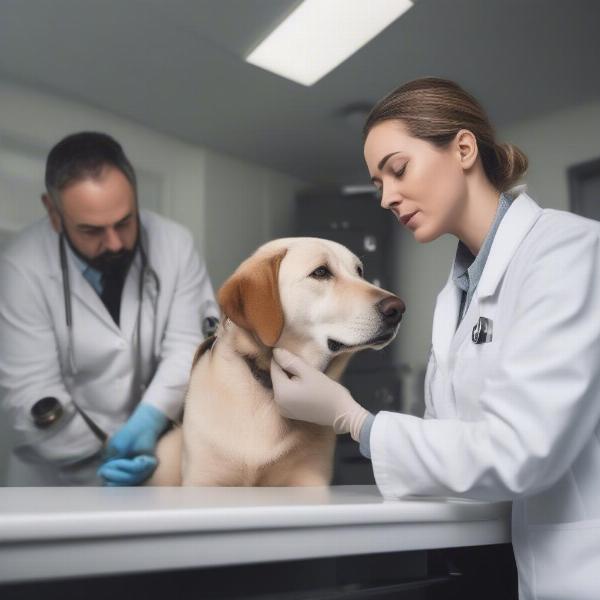If you’re asking yourself, “Why are my dogs acting weird?” you’re not alone. Dog owners frequently observe unusual behaviors in their canine companions, and deciphering these changes can be challenging. From subtle shifts in appetite to dramatic displays of anxiety, a dog acting strangely can be a sign of anything from a minor upset stomach to a more serious underlying health issue. This article will help you understand some of the common reasons behind odd dog behavior and guide you on what steps to take.
Understanding “Weird” Dog Behavior
What constitutes “weird” behavior varies from dog to dog. A sudden disinterest in playing fetch might be unusual for an energetic Labrador, while a typically aloof Greyhound suddenly becoming clingy could also raise concerns. Recognizing your dog’s baseline behavior is crucial to identifying deviations from the norm.
Changes in appetite, energy levels, sleep patterns, social interaction, and vocalizations can all indicate something is amiss. Other signs include excessive licking or scratching, changes in bowel movements or urination, and unusual posture or gait. Paying close attention to these details can help you pinpoint the cause of your dog’s unusual behavior.
Possible Reasons for Your Dog’s Strange Behavior
There are numerous reasons why your dog might be acting strangely. Some of the most common include:
- Illness or Injury: Perhaps the most concerning reason, changes in behavior can often be the first sign of illness. Infections, injuries, and chronic conditions can all manifest as unusual behavior.
- Stress or Anxiety: Just like humans, dogs experience stress and anxiety. Changes in routine, loud noises, new environments, or even the introduction of a new pet can trigger anxiety-related behaviors.
- Cognitive Dysfunction Syndrome (CDS): Similar to dementia in humans, CDS can affect older dogs, leading to confusion, disorientation, and changes in behavior.
- Medication Side Effects: If your dog is on medication, some unusual behaviors might be side effects. Consult your veterinarian if you suspect this is the case.
- Dietary Changes or Allergies: A sudden change in diet or an allergic reaction to food can cause digestive upset and behavioral changes.
- Environmental Factors: Exposure to toxins, extreme temperatures, or changes in the home environment can also contribute to unusual behavior.
When to Seek Veterinary Attention
While not every instance of “weird” behavior requires a trip to the vet, there are certain red flags that warrant immediate attention. These include:
- Sudden onset of lethargy or weakness
- Difficulty breathing or coughing
- Loss of appetite lasting more than 24 hours
- Vomiting or diarrhea, especially if bloody
- Seizures or tremors
- Unexplained aggression or fearfulness
- Difficulty urinating or defecating
- Any signs of pain or discomfort
 Dog at Vet Checkup
Dog at Vet Checkup
If you observe any of these signs, contact your veterinarian immediately. Early diagnosis and treatment are crucial for managing many health conditions.
What to Tell Your Veterinarian
When contacting your vet, be as specific as possible about your dog’s behavior changes. Note when the changes started, how frequent they are, and any other accompanying symptoms. Providing a detailed history can help your veterinarian narrow down the potential causes and make an accurate diagnosis.
Helping Your Dog at Home
While veterinary care is essential for diagnosing and treating underlying health issues, there are things you can do at home to support your dog’s well-being. Providing a consistent routine, a safe and comfortable environment, and plenty of opportunities for exercise and mental stimulation can help reduce stress and anxiety. A balanced diet and regular grooming are also crucial for maintaining overall health.
Conclusion
Observing your dog acting weird can be concerning, but by understanding the potential causes and knowing when to seek veterinary care, you can help your furry friend feel better. Remember, paying close attention to your dog’s behavior and communicating effectively with your veterinarian are key to ensuring their health and happiness.
FAQ
- My dog is suddenly very clingy. Should I be worried? While increased clinginess can sometimes be a sign of anxiety or illness, it can also be a temporary response to changes in the environment. Monitor for other symptoms and consult your vet if the behavior persists.
- My old dog seems confused and disoriented. What could be wrong? Cognitive Dysfunction Syndrome (CDS) can affect senior dogs, causing changes in behavior similar to dementia in humans. Consult your veterinarian for diagnosis and management options.
- My dog is acting strangely after starting a new medication. What should I do? Contact your veterinarian immediately to discuss the possibility of medication side effects.
- How can I help my anxious dog? Providing a consistent routine, a safe environment, and plenty of exercise and mental stimulation can help reduce anxiety. Consult your veterinarian for additional advice or medication options.
- My dog is licking and scratching excessively. Could it be allergies? Excessive licking and scratching can be a sign of allergies, skin irritations, or other underlying health issues. Consult your veterinarian for diagnosis and treatment.
Related Articles on ILM Dog
About ILM Dog: ILM Dog is your trusted international resource for comprehensive dog care and wellbeing. We offer expert guidance on everything from breed selection and health management to training, nutrition, and grooming. Our goal is to empower dog owners worldwide with the knowledge and resources they need to provide the best possible care for their canine companions. Whether you’re a new dog owner or a seasoned expert, ILM Dog is here to support you every step of the way. For any inquiries, contact us at [email protected] or call us at +44 20-3965-8624.